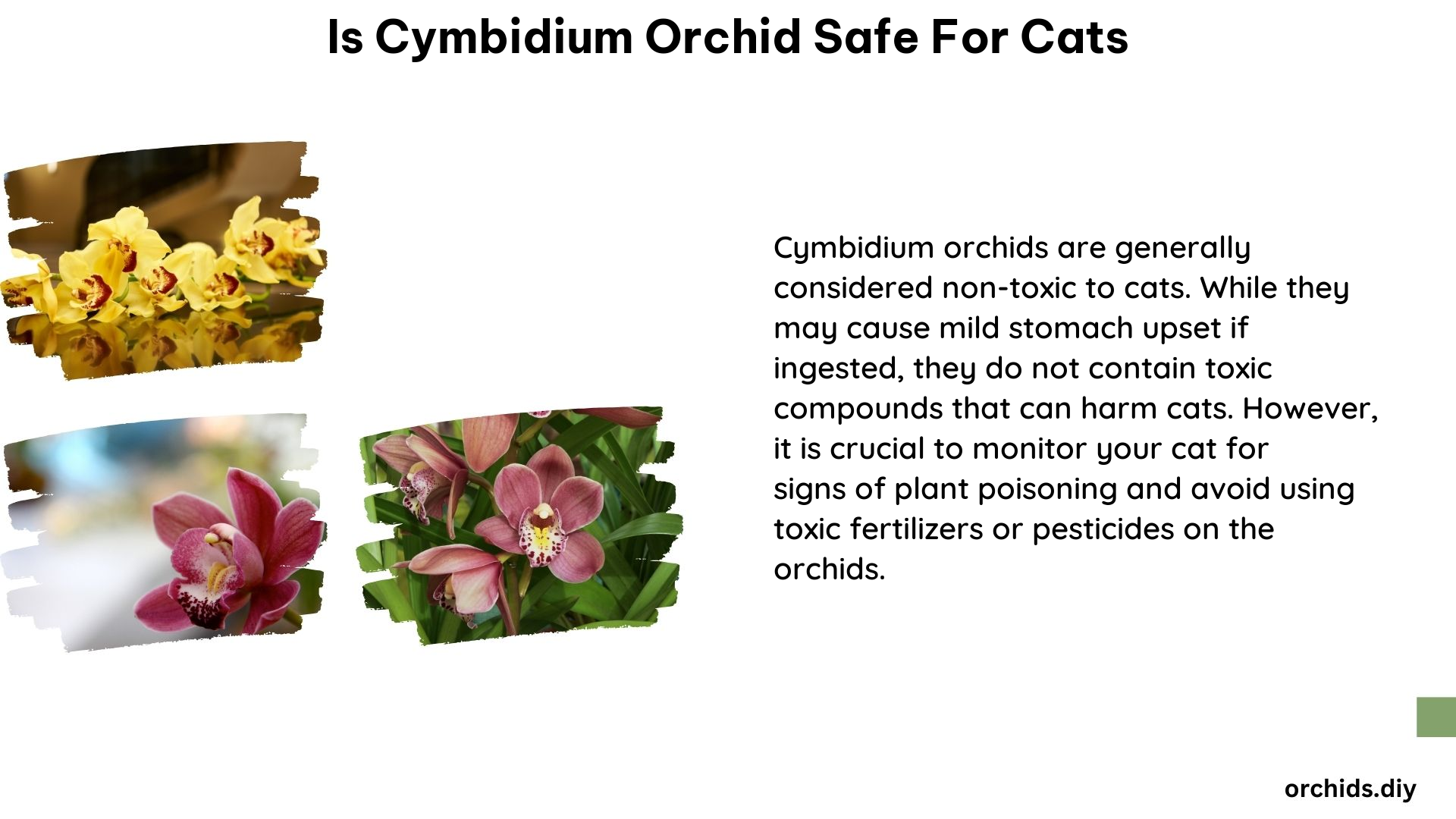Cymbidium orchids are generally considered non-toxic to cats. While they may cause mild stomach upset if ingested, they do not contain any life-threatening toxins. However, it is crucial to be mindful of other potentially harmful plants in your home and to monitor your feline friend closely for any signs of plant poisoning.
Key Points:
- Non-Toxicity: Cymbidium orchids are not toxic to cats and can be safely kept in the same environment without posing a significant risk to your cat’s health.
- Mild Stomach Upset: If your cat ingests parts of the cymbidium orchid, it may cause mild stomach upset, including symptoms like vomiting, diarrhea, and drooling.
- Allergies and Sensitivity: Some cats may be more sensitive or allergic to the plant, which could lead to more severe symptoms. Monitor your cat closely for any unusual behavior or signs of discomfort.
- Prevention: To prevent your cat from nibbling on the orchid, provide alternative sources of fiber like cat grass, and keep the orchid out of reach.
- Other Toxic Plants: Be aware of other plants that are toxic to cats, such as Ago Palms, Amaryllis, Autumn crocus, Azalea, and many others. Keep these plants away from your cat to ensure their safety.
Expert Guides and Troubleshooting Tips:
- Immediate Action: If you suspect your cat has ingested any part of the cymbidium orchid, remove your cat from the area and prevent further exposure. If your cat shows any signs of distress, contact your veterinarian for guidance.
- Monitoring: Keep a close eye on your cat for any signs of plant poisoning, such as vomiting, diarrhea, lethargy, or changes in appetite.
- Fertilizers and Pesticides: Be cautious when using fertilizers and pesticides on your orchids, as these can be toxic to cats. Opt for natural, non-toxic alternatives or avoid their use altogether.
Potting and Decoration Guide:
- Choose a Safe Location: Place your cymbidium orchid in an area where your cat cannot easily access it, such as a high shelf or a cat-free zone.
- Use Cat-Friendly Planters: Select planters that are difficult for your cat to knock over or access, reducing the risk of your cat ingesting the plant.
- Add Decorative Barriers: Use decorative barriers or screens to block your cat’s access to the orchid, ensuring both the plant and your cat remain safe.
Chemical Compounds and Contaminants:
- Chemical Compounds: Cymbidium orchids contain certain chemical compounds that can cause mild stomach upset if ingested in large quantities. These compounds are typically not life-threatening but can cause symptoms like vomiting and diarrhea.
- Fertilizers and Pesticides: Fertilizers and pesticides used on orchids can be toxic to cats. Opt for natural, non-toxic alternatives or avoid their use altogether to ensure your cat’s safety.
References:
- Pets Keepers Guide. (2022). Are cymbidium orchids toxic to cats? Is any kind of orchid poisonous for cats? Retrieved from http://petskeepersguide.com/forums/Thread-Are-cymbidium-orchids-toxic-to-cats-Is-any-kind-of-orchid-poisonous-for-cats
- Cafe Planta. (2024). Is Cymbidium Orchid Toxic to Cats? Retrieved from https://cafeplanta.com/a/blog/is-cymbidium-orchid-toxic-to-cats
- Catster. (2024). Are Orchids Toxic to Cats? Vet Approved Advice. Retrieved from https://www.catster.com/cat-health-care/are-orchids-toxic-to-cats/
- Felt Cave. (n.d.). Cats and Flowers Guide: Are Orchids Poisonous to Cats? Retrieved from https://feltcave.com/blogs/cat-beds/cats-and-flowers-guide-are-orchids-poisonous-to-cats/
- Greg. (2024). Assorted Cymbidium Orchids Are Not Toxic To Cats. Retrieved from https://greg.app/assorted-cymbidium-orchids-toxic-to-cats/
In summary, cymbidium orchids are generally considered safe for cats, as they do not contain any life-threatening toxins. However, it’s important to monitor your cat’s behavior and prevent them from ingesting the plant, as it may cause mild stomach upset. Additionally, be mindful of other potentially toxic plants in your home and keep them out of your cat’s reach.

